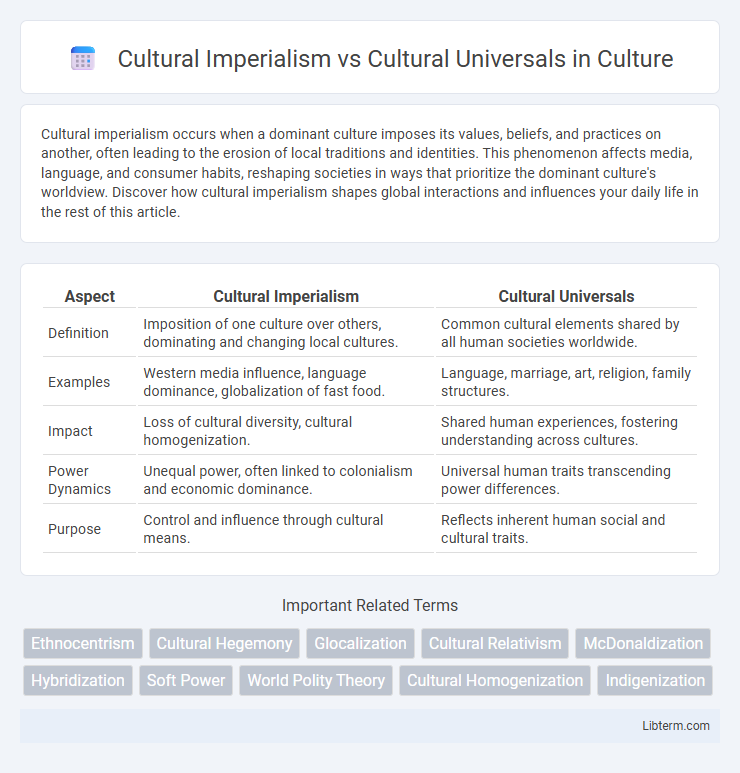Cultural imperialism occurs when a dominant culture imposes its values, beliefs, and practices on another, often leading to the erosion of local traditions and identities. This phenomenon affects media, language, and consumer habits, reshaping societies in ways that prioritize the dominant culture's worldview. Discover how cultural imperialism shapes global interactions and influences your daily life in the rest of this article.
Table of Comparison
| Aspect | Cultural Imperialism | Cultural Universals |
|---|---|---|
| Definition | Imposition of one culture over others, dominating and changing local cultures. | Common cultural elements shared by all human societies worldwide. |
| Examples | Western media influence, language dominance, globalization of fast food. | Language, marriage, art, religion, family structures. |
| Impact | Loss of cultural diversity, cultural homogenization. | Shared human experiences, fostering understanding across cultures. |
| Power Dynamics | Unequal power, often linked to colonialism and economic dominance. | Universal human traits transcending power differences. |
| Purpose | Control and influence through cultural means. | Reflects inherent human social and cultural traits. |
Defining Cultural Imperialism
Cultural imperialism refers to the dominance of one culture over others, often through the imposition of values, beliefs, and practices that overshadow local traditions and identities. It typically involves the spread of cultural products, media, and ideologies from powerful nations, leading to the erosion of indigenous cultures and social norms. This contrasts with cultural universals, which are elements, patterns, traits, or institutions shared by all human societies, reflecting common human experiences rather than cultural dominance.
Understanding Cultural Universals
Cultural universals encompass practices, symbols, and institutions present in every human society, such as language, family structures, and rituals, highlighting shared human experiences across diverse cultures. Understanding cultural universals helps in recognizing the fundamental similarities underlying cultural differences, facilitating cross-cultural communication and reducing ethnocentric biases. This concept contrasts with cultural imperialism, which imposes specific cultural values, emphasizing the importance of respecting inherent cultural commonalities while addressing global cultural dynamics.
Historical Contexts of Cultural Imperialism
Historical contexts of cultural imperialism reveal how dominant powers, such as the British Empire in the 19th century, imposed their language, religion, and customs on colonized societies, leading to the erosion of indigenous cultures. Key examples include the forced adoption of Western education systems in India and the suppression of native languages in Africa, which facilitated political control and economic exploitation. These historical practices contrast with the concept of cultural universals, which emphasize shared human behaviors and values transcending specific civilizations.
Key Examples of Cultural Universals
Cultural universals are elements, patterns, traits, or institutions common to all human cultures worldwide, such as language, family structures, and religious rituals. Key examples include the use of tools, the practice of burial rituals, marriage customs, and moral codes, which demonstrate shared human experiences despite diverse cultural expressions. These universals contrast with cultural imperialism, where dominant cultures impose their values and practices on others, potentially eroding unique cultural identities.
Mechanisms of Cultural Influence and Spread
Cultural imperialism operates through mechanisms such as media dominance, economic power, and political influence, facilitating the spread of one culture's values, practices, and ideologies over others, often leading to cultural homogenization. In contrast, cultural universals emerge through shared human experiences and biological needs, manifesting in common patterns like language, family structures, and rituals that independently develop across diverse societies. Understanding the interplay between imposed cultural norms and inherent cultural traits reveals how globalization shapes identity, innovation, and resistance in cultural exchange processes.
Impacts of Cultural Imperialism on Local Traditions
Cultural imperialism often disrupts local traditions by imposing dominant cultural norms, leading to the erosion of indigenous languages, customs, and social practices. This process can result in the homogenization of cultural expressions, diminishing cultural diversity and heritage preservation. The impacts extend to identity loss among affected communities and decreased transmission of traditional knowledge across generations.
Benefits and Critiques of Cultural Universals
Cultural universals, such as language, family structures, and rituals, foster global understanding by highlighting shared human experiences that transcend individual societies, promoting social cohesion and empathy. These universal elements facilitate cross-cultural communication and cooperation, enhancing collective problem-solving in areas like education and healthcare. Critics argue that emphasizing cultural universals may oversimplify cultural diversity, potentially suppressing unique traditions and reinforcing dominant cultural narratives.
Globalization: A Bridge or a Barrier?
Globalization acts as a dynamic force influencing the tension between cultural imperialism and cultural universals, where dominant cultures often impose values and practices through media, trade, and technology, potentially eroding local identities. Cultural universals, such as language, art, and social norms, emerge globally but are adapted uniquely across societies, illustrating resilience amid homogenizing pressures. This interplay reveals globalization as both a bridge fostering cross-cultural understanding and a barrier challenging the preservation of diverse cultural heritages.
Navigating Cultural Identity in a Connected World
Navigating cultural identity in a connected world requires balancing cultural imperialism, where dominant cultures impose values and norms, against cultural universals, which highlight shared human experiences and practices across societies. Emphasizing cultural universals fosters inclusivity and mutual respect, while awareness of cultural imperialism helps protect indigenous traditions and diverse identities from homogenization. This dynamic interplay shapes individual and collective identities amid globalization, demanding mindfulness in cross-cultural interactions and media consumption.
Future Prospects for Cultural Diversity and Unity
Future prospects for cultural diversity and unity involve a dynamic balance where cultural imperialism risks homogenizing global cultures through dominant media and economic influences, while cultural universals emphasize shared human values and practices that foster integration without erasing uniqueness. Emerging technologies and global communication platforms enable the preservation and revitalization of indigenous languages and customs, promoting cultural pluralism alongside global connectivity. Embracing both cultural diversity and universality can create inclusive societies that respect individual identities while nurturing common human experiences for sustainable cultural coexistence.
Cultural Imperialism Infographic

 libterm.com
libterm.com